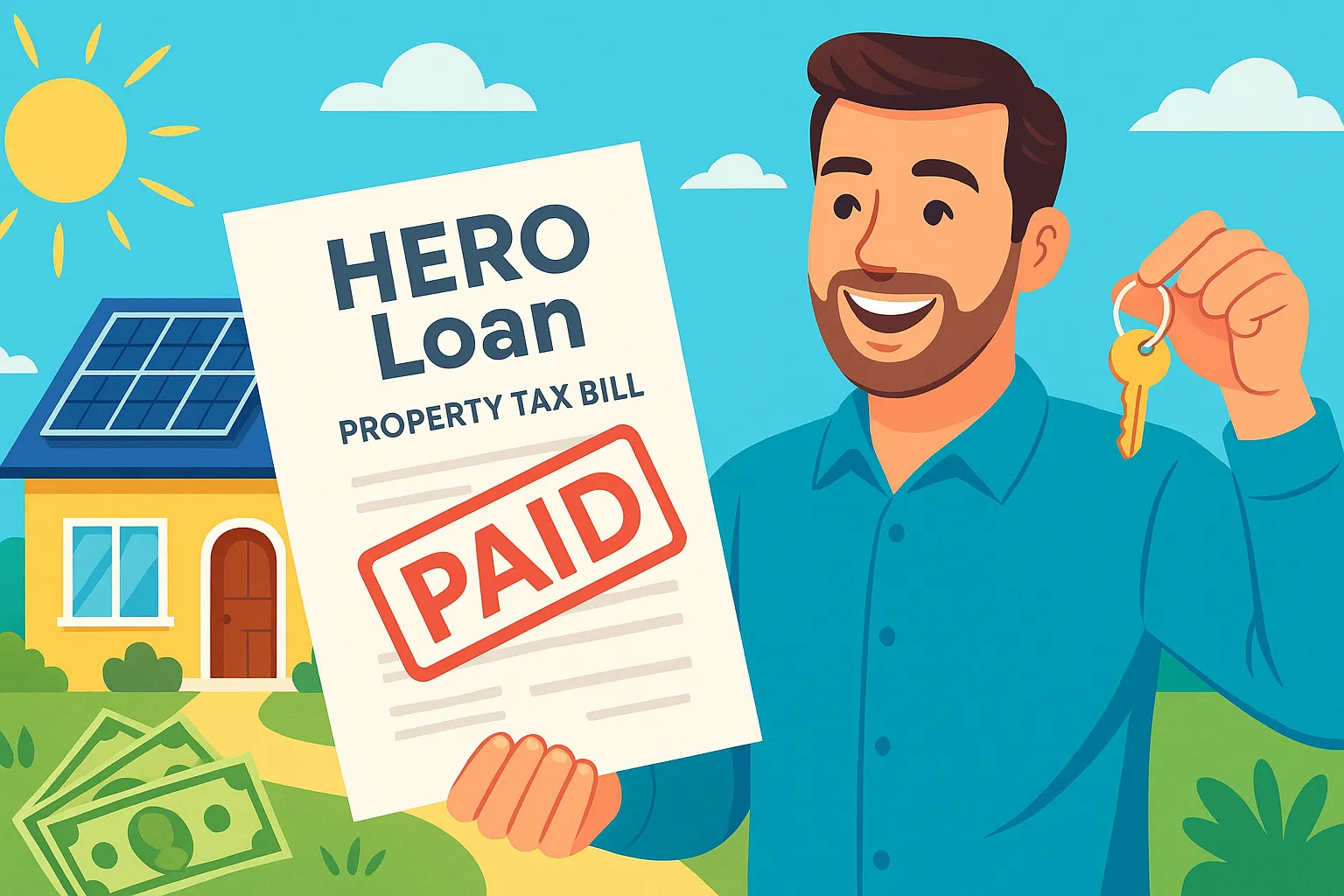Do you feel stuck with your Home Energy Renovation Opportunity (HERO) loan? It’s not just you. Through this government-sponsored program, thousands of homeowners nationwide have made energy-efficient home upgrades, only to later struggle with increased monthly mortgage payments, property tax liens, or obstacles to refinancing.
If you’re wondering how to pay off HERO loan without hurting your finances—or your home’s resale value, Don’t worry. In this in-depth guide, you will learn how to eliminate the hurdles associated with HERO loans, such as priority lien status, and how to use cash-out refinancing and first lien HELOCs to accomplish this.
ow you how to eliminate them using proven strategies like cash-out refinancing, first lien HELOCs, and more.
What you need to know
- Understand how HERO loans work and why they are property assessed clean energy (PACE) programs.
- Learn why HERO loans hold a first lien position that complicates refinancing and selling.
- Discover the best methods for paying off HERO loans, including loan payoff amounts, cash-out refinance strategies, and home equity loan options.
- Compare alternative financing options like energy-efficient home improvements and first lien HELOCs.
- Explore real estate implications and how to avoid issues with tax assessments and property tax bills.
What Is a HERO Loan and Why Is It So Hard To Get Rid Of?
A HERO loan is part of the PACE (Property Assessed Clean Energy) program. It allows homeowners to finance energy-efficient upgrades—like solar panels, HVAC systems, or energy-efficient windows—without upfront costs. Instead of a conventional repayment schedule, the loan is repaid through your property tax bill over a period of 5 to 25 years.
While this may seem like a “good idea” at first, the loan’s structure creates major financial friction points down the line.
The Priority Lien Trap: Why It’s a Problem
Unlike most financing options, HERO loans attach a priority lien to your home—this means the HERO loan takes precedence over your mortgage loan or second mortgage. That lien position makes it nearly impossible to refinance or even sell your home without first satisfying the HERO loan.
🔍 In many cases, traditional lenders will deny your mortgage refinance application because they won’t accept a second-lien position behind the HERO loan.
This has led to a wave of homeowners struggling with loan balance issues, tax lien confusion, and refinancing limitations they didn’t expect.
Step 1: Request Your HERO Loan Payoff Statement
Before you explore any refinancing or alternative repayment methods, you need to know your payoff amount.
To do this, request an official payoff statement from your HERO loan servicer. This document outlines your principal balance, prepayment penalties (if any), and total cost to remove the lien.
Make sure to also review:
- Current property tax assessments
- Your credit report and credit score
- Remaining balance on your mortgage loan
- Property value and any changes due to recent energy-efficient improvements
This preparation is critical if you plan to pursue cash-out refinancing or a home equity loan.
Step 2: How to Payoff HERO Loan: Payoff Options
Here are the three most common ways homeowners pay off HERO loans:
1. Cash-Out Refinance
A cash-out refinance replaces your existing mortgage with a new one—at a higher amount. The excess funds are used to pay off the HERO loan in full. This is ideal if:
- Your home’s built-in equity has increased
- You qualify for a lower interest rate
- You want to consolidate debt into a single payment
Tip: Choose a lender experienced with PACE program liens and who understands the HERO payoff process.
2. First Lien HELOC (Home Equity Line of Credit)
A first lien HELOC allows you to use your home’s equity to pay off the HERO loan, while maintaining flexibility with your monthly mortgage payments. It often comes with a variable interest rate, giving you access to a revolving credit line for future use.
Advantages:
- Retain homeownership flexibility
- Can be used again for clean energy financing or solar installations
- Often features a lower interest rate compared to unsecured loans
3. Home Equity Loan or Second Mortgage
A traditional home equity loan or second mortgage is a fixed-rate loan based on your home’s current equity. It can be used to pay off HERO loans entirely—giving you predictable payments and a clearer path to full ownership.
This approach works well if:
- You don’t qualify for cash-out refinancing
- Your mortgage loan terms are favorable
- You have stable income and a good credit score
Step 3: Consider Alternative Financing for Energy-Efficient Upgrades
If your goal is to continue investing in your property’s efficiency while eliminating your HERO loan, here are smarter alternatives:
Energy-Efficient Home Improvements with Conventional Financing
Instead of using government-backed HERO loans with priority lien issues, many homeowners opt for conventional energy-efficient home improvements financed through:
- Fannie Mae or Freddie Mac approved loans
- VA loans for veterans
- Conventional loans with green energy incentives
- Local governments’ rebate programs
These options avoid the property tax lien structure and offer more lender flexibility.
Clean Energy Financing Through Credit Unions or Community Banks
Community-based lenders often have energy-efficient financing options tailored to your location. These loans provide benefits such as:
- Competitive interest rates
- Lower upfront costs
- Custom repayment schedules
- Potential significant savings on utilities
Step 4: Work with a Specialized Mortgage Adviser
Navigating HERO loan payoff can feel overwhelming—especially when dealing with mortgage advisers, tax assessments, and local governments. That’s why working with a knowledgeable lending expert can make all the difference.
They’ll help you:
- Evaluate loan types and the best fit for your needs
- Understand monthly mortgage payments and tax implications
- Find significant savings through bundling options
- Avoid common traps like prepayment penalties or inflated data rates
HERO Loans and Real Estate: What to Know Before Selling
If you’re planning to sell your home, having a HERO loan can scare off buyers. Most buyers don’t want to take on a home with a PACE lien attached, even if energy-efficient upgrades are included.
To avoid issues during the sale:
- Pay off the HERO loan before listing
- Ensure your tax base reflects the correct property value
- Get a letter of good standing from the loan servicer
- Disclose any home equity investment or HERO liens in your real estate paperwork
Final Thoughts: Take Control of Your Financial Situation
Paying off a HERO loan doesn’t have to feel like a financial trap. With the right payoff process, financing options, and expert advice, you can regain control of your financial future. Whether you’re aiming to sell your home, refinance your mortgage, or simply reduce your monthly payments, understanding your options is the first step.
A well-timed payoff strategy can open the door to better interest rates, significant savings, and peace of mind.
FAQ: HERO Loans and Payoff Strategies
What is a HERO loan?
A HERO loan is a government-backed financing option under the PACE program, used to fund energy-efficient home improvements. It is repaid through your property tax bill and comes with a priority lien.
Why is it difficult to refinance with a HERO loan?
Because the HERO loan sits in first lien position, it makes it hard for lenders to offer a second mortgage or refinance your primary loan.
How do I find my HERO loan payoff amount?
Contact your HERO loan provider and request a detailed payoff statement. This will include your loan balance, any aggressive monthly payments, and remaining term.
Can I use a home equity loan to pay off my HERO loan?
Yes, home equity loans and HELOCs can be used to pay off HERO loans—often with lower interest rates and no impact on your property taxes.
Is a cash-out refinance better than a home equity loan?
It depends on your goals. A cash-out refinance may lower your overall interest rate and consolidate payments, while a home equity loan offers fixed-rate stability.
Are there any penalties for paying off a HERO loan early?
Some HERO loans may include prepayment penalties. Review your original agreement or speak with a financial advisor for clarity.
Can I still get energy-efficient upgrades without a HERO loan?
Yes! Explore clean energy financing through credit unions, conventional loans, or local government programs that don’t place a lien on your home.
Disclaimer: This post is for educational purposes only and is not financial, legal, or tax advice. Do your own research or consult a qualified professional before making any decisions.
Affiliate Disclosure: GetJoeMoneyRight.com is a participant in the Amazon Services LLC Associates Program, an affiliate advertising program designed to provide a means for sites to earn advertising fees by advertising and linking to Amazon.com and affiliated sites.

